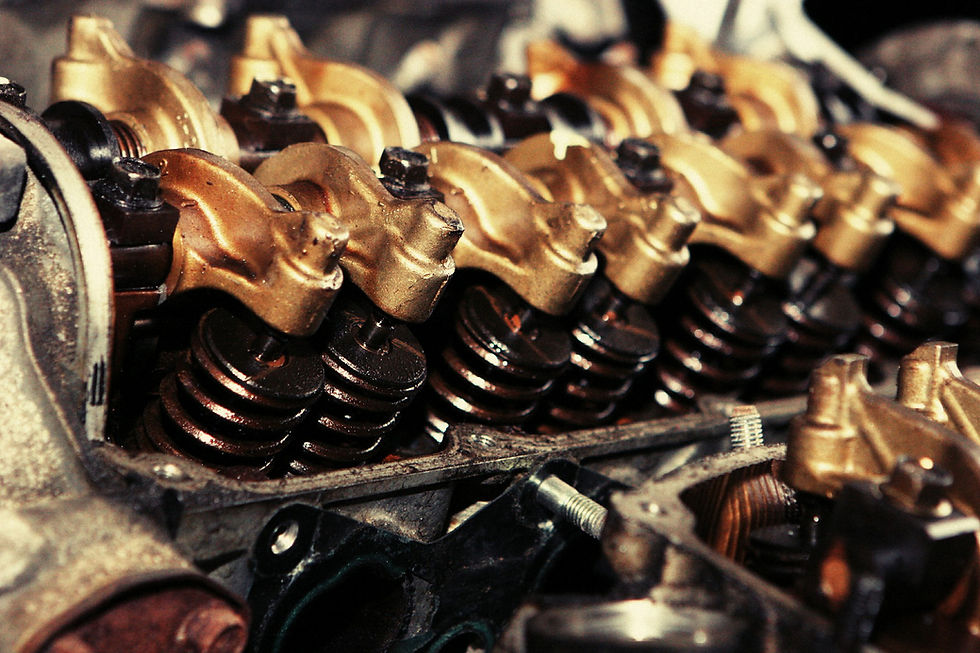How to Diagnose and Resolve Engine Knocking Sounds for Optimal Performance
- Autolast Ghana

- Aug 15, 2025
- 4 min read
Engine knocking sounds can be alarming for any vehicle owner. These unfamiliar noises often signal potential engine issues that can lead to severe damage if left unresolved. Understanding the causes, symptoms, and solutions of engine knocking is vital for maintaining optimal vehicle performance. This guide aims to provide you with practical information on diagnosing and resolving engine knocking sounds, ensuring your vehicle runs smoothly.
Understanding Engine Knocking Sounds
Engine knocking, sometimes described as a pinging or knocking noise, typically arises from irregular combustion in the engine cylinders. This condition can damage vital engine components over time if not addressed promptly.
The sound is usually detectable while accelerating or during normal driving, often indicating a problem with the fuel mixture or engine configuration.
Common Causes of Engine Knocking Sounds
Identifying the source of engine knocking sounds is essential for effective resolution. Here are some common causes:
1. Low-Quality Fuel
Using low-octane fuel can lead to premature ignition of the air-fuel mixture, causing knocking.
Higher-octane fuels are designed to resist knocking, so opting for a higher grade may alleviate the issue.
2. Ignition Timing Issues
Improper ignition timing can cause the fuel-air mixture to ignite too early.
This premature ignition can lead to the characteristic knocking sound, indicating a need for timely adjustment of the ignition system.
3. Carbon Buildup
Over time, carbon deposits may accumulate in the combustion chamber, leading to pre-ignition.
Cleaning or decarbonizing the engine can significantly reduce knocking sounds caused by this accumulation.
4. Worn Engine Components
As components wear out, especially in older vehicles, clearances can become too loose.
These worn components may produce knocking sounds due to decreased efficiency and increased friction in the engine.
5. Engine Overheating
If an engine overheats, it can lead to knocking sounds due to high internal temperatures, causing the air-fuel mixture to ignite prematurely.
Maintaining proper cooling can help prevent this issue.
Diagnosing Engine Knocking Sounds
To accurately diagnose engine knocking sounds, follow these steps:
1. Listen Attentively
Start by listening closely to the sound.
Is it more pronounced during acceleration, or does it occur at idle? Noting when the sound appears is a critical first step in diagnosing its cause.
2. Check Fuel Quality
Evaluate your fuel choice.
Switch to a higher-octane fuel temporarily to determine if the knocking persists. If it subsides, the issue may lie with the fuel quality.
3. Inspect the Ignition Timing
Consult a professional to check the ignition timing of your engine.
This is key, as incorrect timing can lead to severe performance issues.
4. Examine for Carbon Buildup
Consider performing a visual inspection for carbon buildup in the combustion chamber.
If obvious deposits are found, a cleaning procedure may be necessary to remove them and prevent knocking.
5. Monitor Engine Temperature
A rising temperature gauge can signal that the engine is overheating.
Ensuring the cooling system is functioning correctly can prevent further complications, including knocking.
Resolving Engine Knocking Sounds
Once you’ve diagnosed the problem, you can take steps to resolve the engine knocking sounds. Here’s how:
1. Use High-Quality Fuel
Replacing low-octane fuel with a higher-octane option can often reduce knocking sounds.
Regularly using the fuel recommended in your vehicle's owner manual can improve overall performance.
2. Adjust Ignition Timing
If ignition timing is found to be the issue, corrections can often be made through a professional tune-up.
Always consult with a qualified technician for ignition adjustments to ensure accuracy and efficiency.
3. Clean Carbon Deposits
A professional decarbonization service can remove harmful buildup effectively.
This service can enhance combustion efficiency and eliminate knocking sounds associated with carbon accumulation.
4. Replace Worn Components
If internal engine wear is detected, replacing components such as pistons, rings, or bearings may be necessary.
Although this can be costly, it will safeguard against further damage and optimize engine functionality.
5. Maintain Cooling System
Regular checks of the cooling system—ensuring proper coolant levels and checking for leaks—can prevent overheating.
Investing in routine maintenance for cooling components can help avoid problematic engine knocking.
Best Practices for Preventing Engine Knocking
Preventive measures can be taken to avoid engine knocking sounds altogether:
1. Regular Maintenance
Routine checks on engine oil, coolant, and filters will keep your engine performing efficiently.
Adhering to the maintenance schedule specified by the manufacturer is vital for long-term vehicle health.
2. Quality Additives
Utilizing fuel additives designed to clean fuel injectors and combustion chambers can enhance fuel quality.
Investing in good-quality additives can improve overall engine performance and reduce the likelihood of knocking.
3. Monitor Driving Habits
Driving habits can affect engine performance significantly.
Avoiding hard acceleration or excessive idling can lead to a smoother engine operation, minimizing the chances of knocking sounds.
4. Listen for Changes
Being attentive to changes in engine noise can help catch problems early on.
If you notice any signs of knocking or other irregular sounds, don’t hesitate to investigate further.
Conclusion
Engine knocking sounds can indicate various underlying issues, from poor fuel quality to significant engine wear.
Understanding the potential causes and knowing how to diagnose the sounds as well as resolve them can help maintain your vehicle’s performance.
Regular maintenance, quality fuel, and prompt attention to unusual noises will ultimately safeguard your engine’s longevity and efficiency.
Stay vigilant and proactive about your vehicle’s health; ensuring a smooth, knock-free ride is within your reach.

Remember, early detection is key, and addressing engine knocking sounds calmly and efficiently can save both time and money in the long run.




Comments